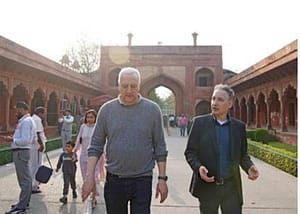The Union Minister of Ports, Shipping and Waterways, Shri Sarbananda Sonowal announced an investment of more than ₹4,800 crore to transform the inland waterways sector of Assam at the Advantage Assam 2.0 in Guwahati, today. The investment is to enable the immense potential that the complex and dynamic waterways system of the state has to offer to propel the growth and development of the region towards realising the vision of Prime Minister Shri Narendra Modi’s Viksit Bharat, Shri Sonowal asserted at the session on Assam’s Roads, Railway and Riverine Tourism on the second day of the investment summit.
Speaking on the occasion, the Union Minister said, “Under the dynamic leadership of Prime Minister Shri Narendra Modi ji, the country is cruising ahead towards realising the vision of Viksit Bharat. Assam along with the Northeast plays an integral part in propelling this journey to realise the vision of Modi ji. Inland Waterways plays a crucial role in this scheme of things as the visionary Modi ji planned its revival since 2014 from near obscurity and neglect of the past. With its rich inter web of riverine system in the region, especially in Assam with Brahmaputra (NW2) and Barak (NW16), the inland waterways aims at rejuvenating its ageless role as the main conduit of trade and commerce. Globally considered as futuristic, the inland waterways provides an opportunity to opt for a more economic, efficient and environment friendly mode of transporting cargo and passengers. With the launch of schemes like ‘Jalvahak’, the Modi government has been incentivising the businesses to switch to inland waterways, thereby, improving the economies of scale, decongesting the railways and roadways and enabling a conducive ecosystem that is vital for pivotal role Assam is set to play towards India’s ascendency to become world’s biggest and an Atmanirbhar economy by 2047.”

At the summit, Shri Sarbananda Sonowal announced allocation of ₹1,500 crore for a planned transition into Green Vessels by 2030 under the ‘Harit Nauka’ scheme. An amount of more than ₹1,500 crore has been earmarked to facilitate cruise tourism and enhance cargo handling capacity by 2027-28 in NW2 and NW16. This includes construction of jetties with on shore facilities at Silghat, Bishwanath ghat, Neamati Ghat and Guijan along with construction of a new building for Regional Office, MSDC, Guest house and office space for ITAT at Fancy Bazar in Guwahati. An amount of ₹375 crore is pegged for development of Phase II of Ship Repair Facility at Pandu. In order to maintain fairway, the government has entrusted Dredging Corporation of India (DCI) to ensure assured draft of 2.5 meters from Bangladesh Border to Pandu in NW-2 till 2026-27. An amount of ₹191 crore has been earmarked for this, Shri Sonowal stated.
Adding further, he said, “Advantage Assam has always served as a catalyst for the region’s economic revival, providing businesses with a strategic platform to expand their trade and investment opportunities. With the immense support that Assam has received from our Hon’ble Prime Minister Shri Narendra Modi ji, we remain firmly committed to the holistic development of the economy of Assam and the Northeast. Among the various ongoing projects to enable inland waterways of Assam, we are also planning to transform the conventional vessels into Green Vessels under Harit Nauka scheme. This affirms the commitment of our government towards sustainable development, a milestone set by our dynamic leader Narendra Modi ji. Given the immense potential of riverine tourism in the state, we are developing an ecosystem including infrastructure and fairway for smooth, regular and viable operations. You may be happy to know that the Dredging Corporation of India (DCI), with its rich experience of dredging at the sea, has been entrusted with dredging the NW2, for the first time on any river in India.”
The Union Minister also announced the development of Water Metro Service in Guwahati and Dhubri for an estimated investment of ₹315 crore. Based on the success of Kochi Metro Service, the feasibility study is being conducted for this. Shri Sarbananda Sonowal also announced deployment of two Electric Catamarans being built by Cochin Shipyard Limited (CSL). A world class cruise terminal will also be built in Guwahati with an estimated investment of ₹100 crore.
In Dibrugarh, an estimated ₹120 crore has been earmarked for development of Regional Centre of Excellence (RCOE). Adding further to the capital development along the NW2, Riverine Lighthouses will be built at FIVE places — Bogibeel, Biswanath, Nimati, Pandu and Silghat — at an estimated cost of ₹100 crore. In addition, a sum of ₹150 crore has been earmarked for fairway development with LAD of 2.5 meters between Pandu and Bogibeel. TWO Cutter Section Dredger units will also be purchased for Brahmaputra (NW2).

The Inland Waterways Authority of India (IWAI), the nodal agency for the riverine transportation including national waterways under the Ministry of Ports, Shipping and Waterways (MoPSW), is implementing projects worth ₹1,010 crore along river Brahmaputra (NW2) and river Barak (NW16) in Assam. Among the major projects, the ship repair facility is being built at Panda with an investment of ₹208 crore while an alternate road from Pandu to NH27 is being built at an investment of ₹180 crore. New Inland Waterways Terminal (IWT) at Bogibeel as well as at Jogighopa —- with more than ₹66 crore and ₹82 crore of investment —- are being developed on Brahmaputra to ‘enable possibilities meet opportunities’, Shri Sonowal added.
An investment of more than ₹646 crore has been earmarked to construct riverine infrastructure across Brahmaputra under the Sagarmala Scheme, the flagship programme of the Ministry of Ports, Shipping and Waterways. For Barak River, the Union Minister announced procurement of Survey Vessel, procurement of THREE Amphibian Dredgers, construction of Crane Pontoon and Gangway for proving Floating Terminal facilities in Karimganj, construction of Steel Pontoon and Gangway for providing Floating Terminal facilities at Badarpur among other projects.
At this session, the Union Minister was joined by the Chief Minister of Assam, Dr Himanta Biswa Sarma; Minister of Animal Husbandry, Veterinary, Fishery and PWRD, Govt of Assam, Krishnendu Paul; Chairman of IWAI, Vijay Kumar; High Commissioner of Singapore, His Excellency Simon Wong among other officials and corporate leaders from infra, railways and marine sector.


























